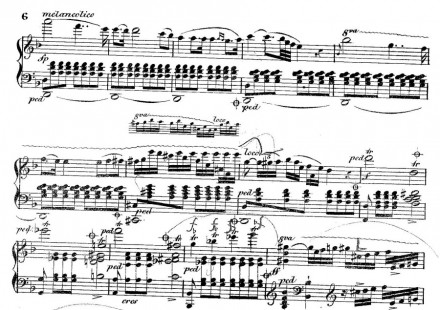Friedrich Kalkbrenner (1785-1849) – Part 2
Then suddenly in 1814 he arrived in London where he was immediately accepted as one of the leading pianists and composers and where he was about to spend the next successful 10 years. He was also the most expensive and sought for teacher. In London in 1823 is composed and performed his first piano concerto in d minor op.61, a significant example of the early romantic music. Aside Hummel’s concerto in a minor op.85 (1816) [youtube]http://www.youtube.com/watch?v=XPrM4mpeqYQ[/youtube] that concerto had greatly influenced Chopin, the dedication is not without reason.
Kalkbrenner Concerto First movement Solo

With the concerto Kalkbrenner went on a Europe tour in 1824. In Vienna he was allowed to use Beethoven’s Broadwood grand piano for a concert. The same instrument that Broadwood sent himself in 1818 from London to Beethoven as a gift. There is at least one letter by Beethoven which shows that it might have been a closer relationship between the two musicians:
“My dearest friend!.. … But I hope that you are going to stay in Vienna a little longer, particularly as in many quarters I hear wishes expressed that you would give another concert, an undertaking that I take most lively interest; and, if you do this, you will most certainly be able to take all those works of mine to London.
With all my heart I embrace you; and my sole desire is to be able in some way to serve you —
In sincere friendship,
Your Beethoven“
For an unknown reason in 1824, after his Europe tour, Kalkbrenner moves again, now to Paris, where he spends the rest of his life.
Kalkbrenner was not only a pianist, composer and teacher; he was a successful businessman too. Already in London he associated with Johann Bernhard Logier. Soon after his arriving in Paris he became an associate of Pleyel’s piano manufactory. So later (1838) Chopin’s Pleyel piano in Mallorca was sent with the help of Kalkbrenner.
In his last years Kalkbrenner played very seldom because of health problems, still he continued his other musical occupations. As not everyone is blessed with never ceasing source of inspiration, Kalkbrenner’s works of this last period cannot be compared with his earlier compositions, which I definitely prefer.
William Newman writes in his book “The sonata since Beethoven”: “And Schumann, ever honest, wrote that he was no “great worshipper” of Kalkbrenner, but in his earlier years had enjoyed the ”first, lively, truly musical sonatas” of Kalbrenner’s youth and, until genuine Romanticism passed him by, continued to enjoy the music of “one of the most skilled, masterly piano composers for finger and hand”.
His stiff old fashioned English manners and pompous appearance looked almost ridiculous in the French capital city and the aging Kalkbrenner was often an object of jokes and mockery. The attempt to promote his son Arthur as a music wunderkind failed lamentably. He died of cholera the same year as Chopin, in 1849.